The Orange – Wendy Cope
Waking up to this poem every morning is definitely its own vibe. I’m so here for it.
-Andrea x

Andrea Wold Johansen
Waking up to this poem every morning is definitely its own vibe. I’m so here for it.
-Andrea x
Sweet Thames, run softly, cause I speak not loud or long
Intertextuality and double meanings, the decay of modernity, the wonders of love and the sanctity, the confusion and the double standards of sexuality, of cahstity and of the idea of marriage. The third section of The Waste Land is an intense section, and honestly, it has it all. The Fisher King reappears, Eliot keeps alluding to classical literature and to Shakespeare’s The Tempest like he did in the previous sections, and he intertwines the present and the past, the then and the now to show the interconnectedness of, well, humanity.
I think possibly one of my favourite things about this part is the stilted post-love scene, the one where “the typist home at tea time” turns away and looks at herself in the mirror for only a moment.
She turns and looks a moment in the glass,
III. The Fire Sermon, lines 249-256
Hardly aware of her departed lover;
Her brain allows one half formed thought to pass:
Now that’s done and I’m glad it’s over.
When lovely woman stoops to folly and
Paces about her room again, alone,
She smoothes her hair with automatic hand,
And puts a record on the gramophone.
I love how every second line of this stanza is written in iambic pentameter, whilst the other lines are almost iambic but not quite there. It feels like the stanza is trying to be a sonett, trying desperately to tell a love story of the ages, but reality just falls that little bit flat and for this typist, a love story like that was just never in the cards (Madame Sosostris’s or anyone else’s). However, she smoothes her hair and puts her favourite tunes on, and in one way or the other, she is fine anyway.
Oh well.
These musings are in no way a good analysis of this wonderful part of the poem, but that’s not really the point either. I just wanted to ramble for a moment as this section is one that both intrigues, confuses and fascinates me, and I hope you find something in it that can make you go “hmmmm,” too.
-Andrea
This page saw no updates in May, but that doesn’t mean nothing happened!
On May 3rd I sat my American politics exam, and on May 4th I started a new job! It’s a full time position as a librarian, working both at the library in town and at a youth club at the House of Literature. The job is filled to the brim with creativity, with challenges, with colleagues and with care. I’ve had a month of getting settled and finding my feet with it now, and I honestly feel so lucky to call this my job: working alongside great colleagues to create a safe and fun environment for kids and young people, centered around literature, creativity and giving them space to express themselves by the words they write and the things they create. I’m looking forward to all the things I’m yet to learn and all the challenges still to master, but the first impression I’ve had of this job is marvellous. Can’t wait to see what happens next!
In May, I got through:
The Dictionary of Lost Words – Pip Williams
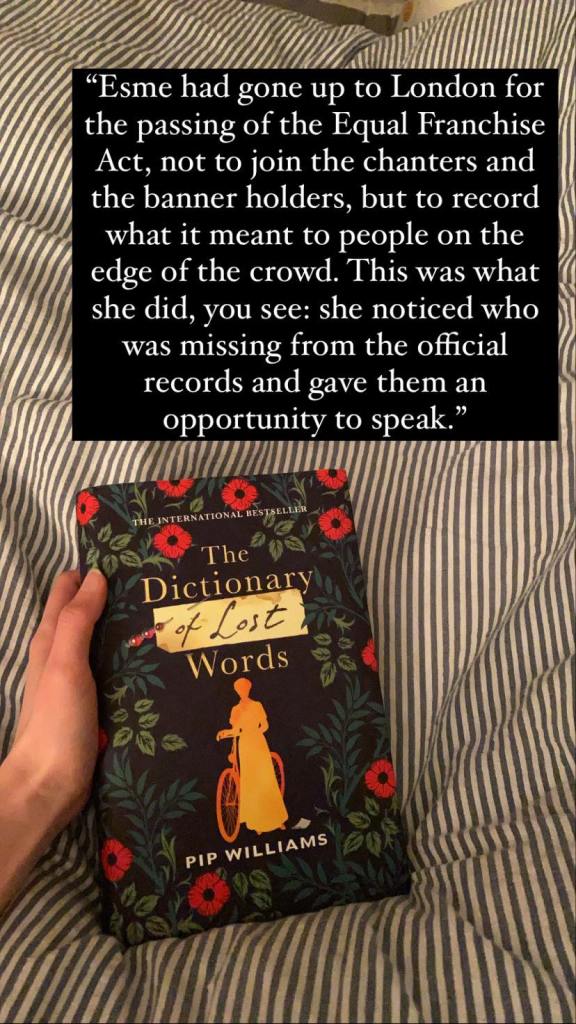
“In 1901, the word ‘Bondmaid’ was discovered missing from the Oxford English Dictionary. This is the story of the girl who stole it. Esme is born into a world of words. Motherless and irrepressibly curious, she spends her childhood in the ‘Scriptorium’, a garden shed in Oxford where her father and a team of dedicated lexicographers are collecting words for the very first Oxford English Dictionary. Esme’s place is beneath the sorting table, unseen and unheard. One day a slip of paper containing the word ‘bondmaid’ flutters to the floor.”
This book is a beauty, looking at the meaning we assign to words and the dangers of assuming some words more important than others simply because they are written down more. The book lets you witness Esme’s life through the words she seeks out like a detective on a mission – words deemed unworthy because they’re spoken by women with brightly coloured shawls in the market place and not by dusty scholars with brown leather shoes. Cathy, a very good friend from England, read and loved this book, and was kind enough to send her beautiful copy my way, and so one day this popped down in my mail box as a complete surprise! Would definitely reccomend this to anyone interested in words, their sound and their power.
How to get Filthy Rich in Rising Asia – Mohsin Hamid
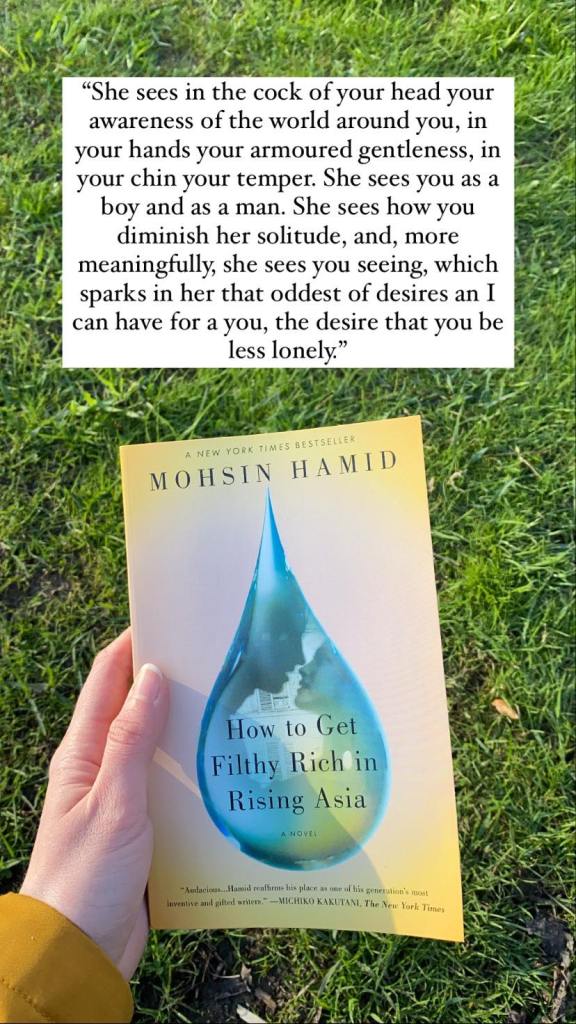
“The astonishing and riveting tale of a man’s journey from impoverished rural boy to corporate tycoon, it steals its shape from the business self-help books devoured by ambitious youths all over “rising Asia.” It follows its nameless hero to the sprawling metropolis where he begins to amass an empire built on that most fluid, and increasingly scarce, of goods: water. Yet his heart remains set on something else, on the pretty girl whose star rises along with his, their paths crossing and recrossing, a lifelong affair sparked and snuffed and sparked again by the forces that careen their fates along.
How to Get Filthy Rich in Rising Asia is a striking slice of contemporary life at a time of crushing upheaval. Romantic without being sentimental, political without being didactic, and spiritual without being religious, it brings an unflinching gaze to the violence and hopes it depicts. And it creates two unforgettable characters who find moments of transcendent intimacy in the midst of shattering change.”
Finished this book in two days and absolutely loved it. The second person pov doesn’t feel forced at all, the language is so vibrant and alive and the story, though quiet at times, is such a beautiful and graceful study of characters, of life and what hope and success might come to mean at different points in life and for different people from different walks of life. I’m pretty sure I wouldn’t have picked this book up on my own, but I got it sent through the Life’s Library book club, and am so glad I was given that gentle push to read it!
Please Come Off-Book – Kevin Kantor
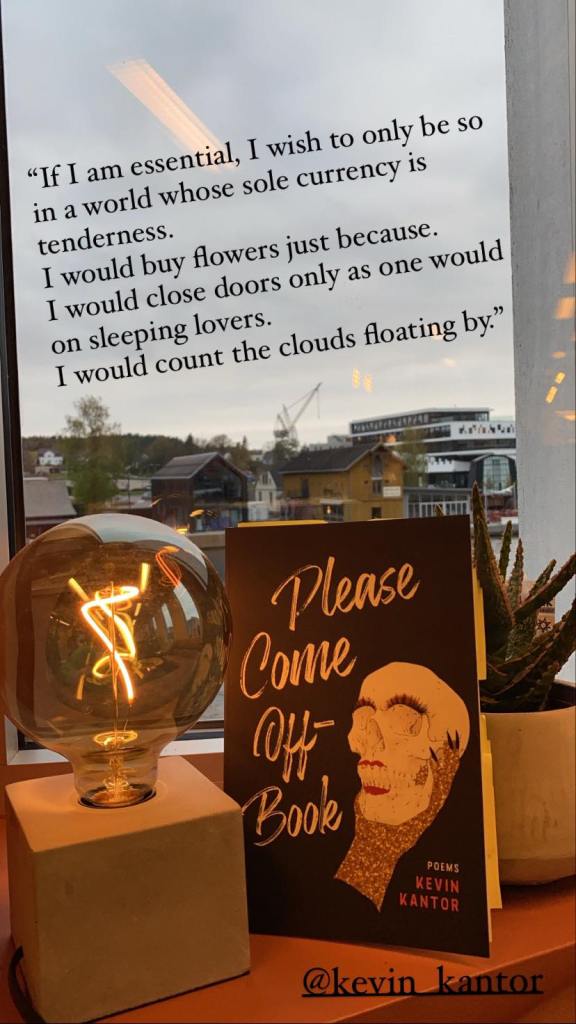
“Please Come Off-Book queers the theatrical canon we all grew up with. Kantor critiques the treatment of queer figures and imagines a braver and bolder future that allows queer voices the agency over their own stories.
Drawing upon elements of the Aristotelian dramatic structure and the Hero’s Journey, Please Come Off-Book is both a love letter to and a scathing critique of American culture and the lenses we choose to see ourselves through.”
I’ve been following Kevin Kantor’s poetry online since about 2015, and along with Sarah Kay and Phil Kaye, Kantor’s spoken word performances was one of the things that really made me fall in love with poetry. It was strange reading their words “cold” on a page, not actually hearing the musicality of Kantor’s voice, but this collection is a beautiful one – chilling and heartbreaking and musical to boot. Really liked this one.
The Magician’s Land – Lev Grossman

“Quentin Coldwater has lost everything. He has been cast out of Fillory, the secret magical land of his childhood dreams that he once ruled. Everything he had fought so hard for, not to mention his closest friends, is sealed away in a land Quentin may never again visit. With nothing left to lose he returns to where his story began, the Brakebills Preparatory College of Magic. But he can’t hide from his past, and it’s not long before it comes looking for him. Meanwhile, the magical barriers that keep Fillory safe are failing, and barbarians from the north have invaded. Eliot and Janet, the rulers of Fillory, embark on a final quest to save their beloved world, only to discover a situation far more complex—and far more dire—than anyone had envisioned.
Along with Plum, a brilliant young magician with a dark secret of her own, Quentin sets out on a crooked path through a magical demimonde of gray magic and desperate characters. His new life takes him back to old haunts, like Antarctica and the Neitherlands, and old friends he thought were lost forever. He uncovers buried secrets and hidden evils and ultimately the key to a sorcerous masterwork, a spell that could create a magical utopia. But all roads lead back to Fillory, where Quentin must face his fears and put things right or die trying.“
This book surprised me a lot! As earlier mentioned, I really like the SyFy show based on Grossman’s Magicians books, but I didn’t really like the first and second book in the series. There was something about how the characters were written, the pessimistic negativity and self-centeredness that surrounded them. I am all for a flawed and unlikeable hero, but sometimes it all just gets a bit much. However, the third book takes place a bit after the first two, and I liked this a lot better! It honestly felt like the characters had grown up a bit, and following them on their journey was a lot more fun and interesting this time around.
The Future – Neil Hilborn

“Neil Hilborn’s highly anticipated second collection of poems, The Future, invites readers to find comfort in hard nights and better days. Filled with nostalgia, love, heartbreak, and the author’s signature wry examinations of mental health, this book helps explain what lives inside us, what we struggle to define. Written on the road over two years of touring, The Future is rugged, genuine, and relatable. Grabbing attention like gravity, Hilborn reminds readers that no matter how far away we get, we eventually all drift back together. These poems are fireworks for the numb. In the author’s own words, The Future is a blue sky and a full tank of gas, and in it, we are alive.”
The blurb says it all – hopeful comfort and hard-hitting sarcasm side by side. I took my time tasting every single poem in this collection, and both individually and as a whole, they were their own little constellations. Really enjoyed it.
I’ll Fly Away – Rudy Francisco

“In his stunningly intimate, highly anticipated follow up to Helium, Rudy Fransisco has created a collection of poems that savor the day-to-day. Treating it as worship, turning it into an opportunity to plant new seeds of growth. Language so often fails us, but Fransico has found his way around this as he creates his own words for the things our language cannot give name to. “Felenter (Noun) Definition: Someone who finds joy in things that people believe to be mundane.” I’ll Fly Away Uses fascinating metaphors to convey common emotional states. These poems are an act of remembrance, and an act of believing that you dear reader, are a celebration waiting for the lights to come up.”
I love poetry that focuses on the beauty of day-to-day life, and this collection definitely did just that. Once again, the blurb says it all. Creating new words where the English language just won’t do is such a poetic solution to a poetic, emotive problem, and such a testament to the notion that language is a living, breathing being, constantly changing and growing to fit the needs of the communities were it’s spoken. The definitions he’s written down for all the new words are also beautifully phrased, and this is definitely worth a read.
Gosh, this became a ramble and a half! If you made it to the end I thank you and salute you. I hope June treats you well, and that you get clear skies above your head and green grass under your feet.
-Andrea
April came and went on the wind, and now we’re heading into May. Gosh, am I excited!
April saw spring rain and both warmer weather and chillier winds. April saw a new niece born, an older brother settling into a new role, a semester of courses done and dusted (only exams left), shaky job interview becoming a full time position, a lot of tea drank and a lot of phone calls and emails. I’m starting up in said new position on May 4th – and I’m so excited to get started with this new line of work! It’s all about literature, creative workshops and working with people. I’m so ready to get started and into it!
This month hasn’t lent itself all too well to reading, but the two reads (plus one re-read) I got through were all kinds of wonderful and definitely deserving of their own post.
Set Me on Fire, a poem for every feeling – Ella Risbridger
“Broad in scope, generous in spirit and wittily accompanied by Risbridger’s commentary. Set Me On Fire is an anthology for a new moment in poetry: a collection of fresh, vibrant voices from poets all over the globe, both living and dead. With an intuitive, accessible, feelings-first format, these are poems for the moments when you really need to know that someone else has been there too.“
Okay, I won’t yell anymore about this anthology, although it’s an absolutely beautiful collection. I did however, do a bit of an overexcited shout in this post, if you want to read why I loved it so much and what I feel this collection is doing for poetry readers old and new, in general. Tldr; wonderful book – please give it a chance.
The Duchess War – Courtney Milan

“Miss Minerva Lane is a quiet, bespectacled wallflower, and she wants to keep it that way. After all, the last time she was the center of attention, it ended badly–so badly that she changed her name to escape her scandalous past. Wallflowers may not be the prettiest of blooms, but at least they don’t get trampled. So when a handsome duke comes to town, the last thing she wants is his attention.
But that is precisely what she gets.
Because Robert Blaisdell, the Duke of Clermont, is not fooled. When Minnie figures out what he’s up to, he realizes there is more to her than her spectacles and her quiet ways. And he’s determined to lay her every secret bare before she can discover his. But this time, one shy miss may prove to be more than his match…”
Two of my friends in Winchester sung the book series The Brothers Sinister’s praises, but I never picked any of them up before now. So glad I did, though – this is such an enjoyable read! Witty dialogue, clever characters, rich description, harrowing backstories and regency era romance.
This has been my first proper foray into historical romance and I am here to stay!
Our Numbered Days – Neil Hilborn
“‘When you’re dumb enough for long enough, you’re gonna meet someone too smart to love you, and they’re gonna love you anyway, and it’s gonna go so poorly,’ Neil Hilborn writes in his debut full-length collection, OUR NUMBERED DAYS. In 2013, Hilborn’s poem “OCD” went viral, and has amassed over 11 million views to date. While this collection ruminates on love, heartbreak, and mental illness, these poems are anything but saccharine. Hilborn uses the same humor and self-deprecation that propelled “OCD” to success in order to make his unmatched vulnerability all the more powerful. Ultimately, Hilborn is a poet of the people: his work is accessible, honest, and entertaining–a revitalizing entry in contemporary poetry.”
The blurb on this book is really more of a review (as often is for poetry books), but I wanted to keep it as it just depicts the feeling of the collection so well. I first read this in 2016 and have reread it multiple times – sometimes looking up specific poems for specific moments and sometimes devouring it as a whole, seeing what new connections lay bare to be discovered, reading new stories between the lines, finding new favourites. This reread was a read of the whole collection and a definite reminder to why I keep coming back to it.
One of my favourite quotes in the book, the line I always have to stop and take an extra breath at, is this one from “This is Not the End of the World”:
“whatever you are feeling right now, there is a mathematical certainty that someone is feeling that exact thing. This is not to say you aren’t special. This is to say thank god you aren’t special.” I had this taped to the corner of my mirror in my uni flat, and it’s a sentence I keep coming back to. It’s also definitely a line that matches the feeling of the rest of the collection really well.
A month in books and a month in seconds. It’s been a good one.
-Andrea
it’s time
A little wile ago I posted an impromptu mid-American lit assignment-reading of the first part of “The Waste Land” by T. S. Eliot, and just for the fun of it, I’ve decided to make this into a mini series. The post, where I discuss why I really like this poem and read the first part can be found here, so in this post I think we’ll talk a bit more about the second part on its own!
“II. A Game of Chess” is where Eliot’s fragmentation really starts to show: this is not only where his character voices start to blur and go hazy, but where the shape and format of the poem starts to change.
The first part of the second part (okay, hang tight, this might get a bit confusing) sketches a noble woman taking in her surroundings, questioning her life and her everyday. In this part, Eliot’s use of imagery is exquisite and exuberant – you as the reader can almost feel yourself revelling in satin fabrics and lush candle light. The noble woman’s thoughts are disjointed and fragmented, however, and her existence is not a happy one, no matter the jewels and riches she owns.
The second part of the second part (told you this was gonna get bad) is a disjointed conversation between two speakers, neither of which we know the identity of, but whose state of mind we know is anxious, paranoid or at the very least strongly uncertain. This is one of my favourite stanzas of the poem, if only for the line “I think we are in rat’s alley / where the dead men lost their bones.” Normally lines like this don’t really get to me, but this one is just so wonderfully creepy and kind of stands out starkly from the rest of the poem. This is also where Eliot quotes Shakespeare for the second time in about 5 stanzas, saying “those are pearls that were his eyes”, and thus writing himself into the literary historical canon, changing the meaning of that sentence to no longer be about 15th century ships but to now pertain to desperate back alley abortions. Awful subject matter, wonderful poetic implementation.
The third part of the second part (nearly there!) is The Gossip’s part, and this is also delightful. This part is another one that starkly contrasts the rest of the poem, but to be fair, that’s kind of the point of the whole poem, isn’t it – to just be one big contrast, conveying a conflicting set of confusing emotions and situations. In this last part of “A Game of Chess”, we meet a woman in what seems to be a pub, dishing out the gossip on another character whose husband has been away fighting in the first world war. The story gets more and more into the dark secrets and life of the woman not present, Lill, it feels like it is told on a single breath with half a pint recklessly clutched in an eager hand, and it is only occasionally interrupted by the bar keep or pub owner shouting “HURRY UP PLEASE, IT’S TIME”. Time to close the pub down, no doubt, time to get the gossips out, but as a reader you’re inevitably left wondering “time for what else, though?”
Gosh, I love this poem and all its strange features and characters.
-Andrea
In his novel The Fault in our Stars, John Green writes that “sometimes, you read a book [that] fills you with this weird evangelical zeal, and you become convinced that the shattered world will never be put back together unless and until all living humans read the book,” and wonderfully dramatic and rather intense as this notion may be, I have just read one of those books and perfectly get the feeling. I might not go shouting from the rooftops just yet, but I desperately want to break down some walls and do a few small yells at least.
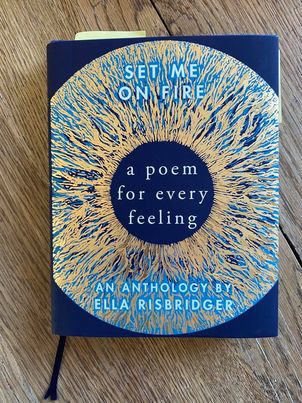
Set Me On Fire – a poem for every feeling is a poetry anthology edited and annotated by London based poet Ella Risbridger, and it is one of the most interesting anthologies I’ve read in a while. It is not simply a collection of poems – it is a collection of poems written by a very diverse group of poets, sorted after vague feelings (like “mother” which is not really a feeling at all and “hunger” which definitely can be) and placed in the cross sections of said feelings (combine these two into “mother/hungry” and suddenly you have a feeling you might be a bit unsure of what actually means until you read the poems and never spend another minute wondering).
What got me about this anthology was firstly, the varied voices of the poets, all the different stories I most likely never would have found on my own, and secondly, the editor’s annotations – witty, clever and intelligent. Risbridger has sprinkled footnotes throughout the book, sometimes recounting how she felt reading this exact line in that exact poem for the first time, throwing in some literary analysis or simply handing the reader an extra little thought connected to the words on the page. One of my favourite notes is this little footnote in “The Orange” by Wendy Cope:
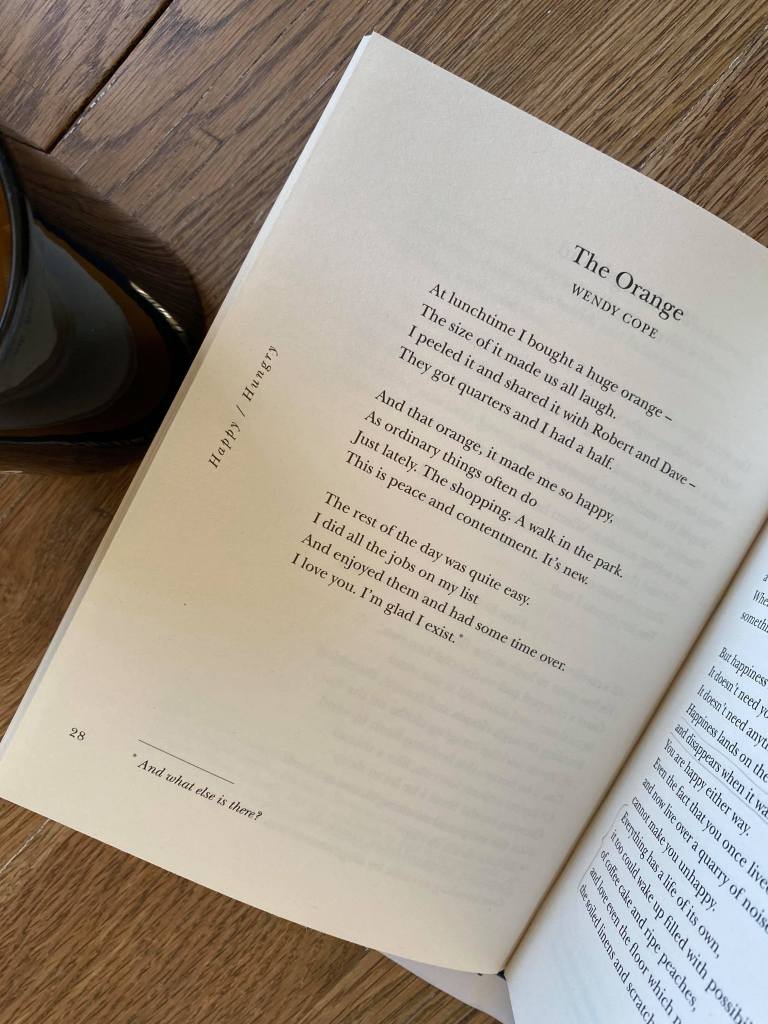
Adding “And what else is there?” to the sentence “I love you. I’m glad I exist” just feels like taking all those feelings that are just too big to fit into our breaths and condencing them into mere by-pass-thoughts, observations done in happiness, and I adore it.
The annotations, like this note on Rebecca Perry’s poem “Other Clouds”:
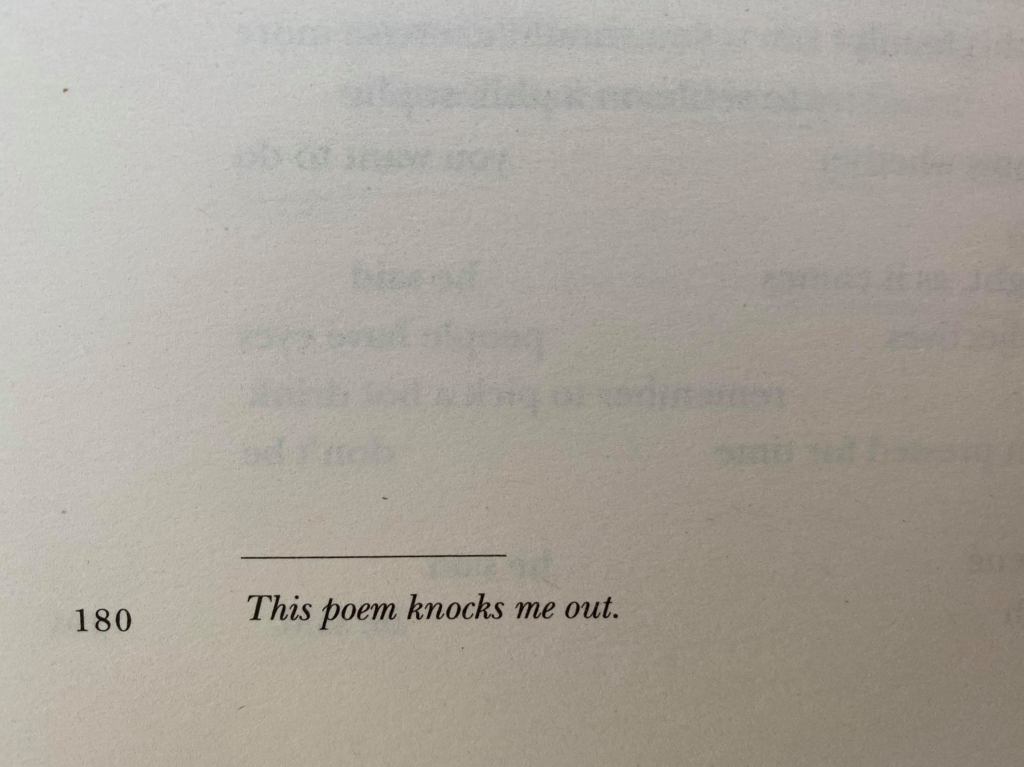
makes the whole anthology a thoroughly pleasant reading experience. Every page turnt feels like being curled up on the sofa reading poetry with a good friend, and I’m loving how accessible the editor has made the chosen poems and poetry in general. Her notes focus a lot on how there is no right or wrong way to read poems, and that reading poetry should be fun or cathartic or whatever you need it to be in the moment. If a poem isn’t working for you this is neither you nor the poem’s fault and you are well within your rights to simply walk away. Poetry is a lot better than just suffering through poems that don’t speak to you, just for the sake of having read them.
Risbridger has also included a short introduction about how this anthology should be read (spoiler alert: again, there is no right way to read it! Just pick a page and go from there or find the feeling you need to read about right about now and see what happens) and a rather long after word talking about the process of gathering poems for this anthology. The afterword is a super interesting read – combining poetry reading, spread sheet making and the demographic statistics of the UK. In the after word she talks about how she has made a conscious effort to make the anthology as diverse as possible, to reflect the diversity found among people and to fight the dominance of “dead white men”, also known as the voices who’ve definitely taken up the most space on the traditional poetry scene (or pages, I guess).
This book is dedicated to “Caroline, who hated poetry first”, and Sarah Perry claims that the collection which is “broad in scope, generous in spirit and wittily accompanied by Risbridger’s commentary” will “offer a cure for those suspicious of poetry, while those already in love with the form have new and startling pleasures in store”.
In short, an anthology for people who already love poetry and a book of poems for people not too sure about poems to begin with.
Definitely worth a read, and if you do pick it up, be sure to let me know how you find it!
-Andrea
And just like that both February and March has packed their suitcases, too.
The last days of February saw days of wonderful spring up here in Norway, and it was so tempting to just pack up and away all of winter’s coats and scarves and declare it spring time immediately. Then the first days of March brought cold winds again, however, and the rest of the month has served more gray days. Oh well, at least it’s getting lighter in the evenings!
Here are the reads I got through in February and March – hang tight, it’s a varied but lovely bunch and a bit of a long ride (press the read more tab to access the full list of books)!
Their Eyes Were Watching God – Zora Neale Hurston
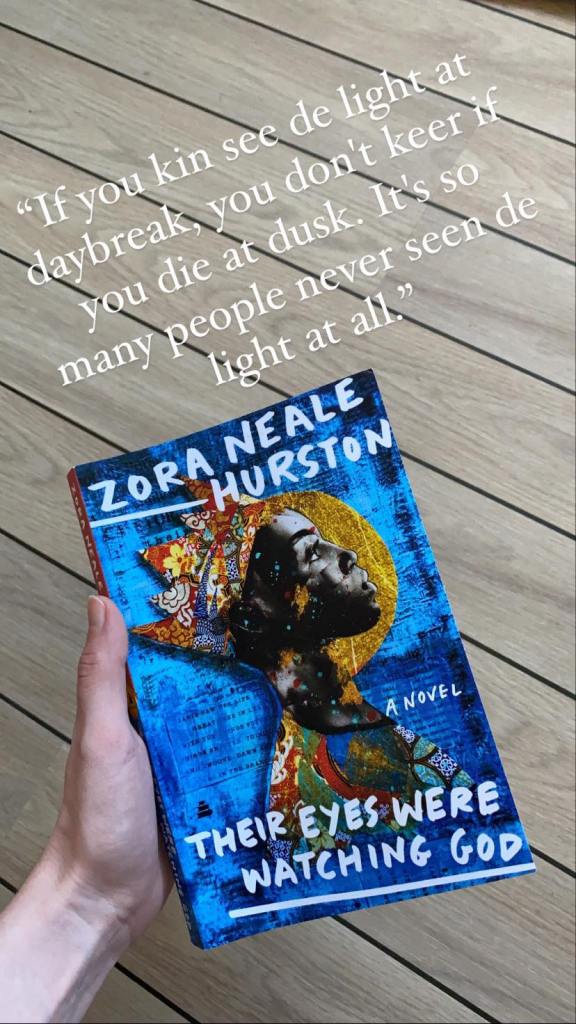
“Zora Neale Hurston’s beloved 1937 classic is an enduring Southern love story sparkling with wit, beauty, and heartfelt wisdom. It is told in the captivating voice of the fiercely independent and stunning Janie Crawford, who refuses to live in sorrow, bitterness, fear or foolish romantic dreams. As she endures three marraiges and a life marked by trials and tribulations, she evolves into an unforgettable heroine. A true literary wonder, Hurston’s masterwork remains as relevant and affecting today as when it was first published.”
Read MoreThey called me the hyacinth girl
“The Waste Land” by T. S. Eliot was one of those poems I could not find myself enjoying when I read it for a poetry module in my first year of uni. It’s fragmented, it’s confusing and it has myriads of speakers, every new voice stranger than the last – I wanted to like it, I just couldn’t get the hang of it and there was never enough time in the syllabus to actually cement any real understanding of it.
With time, this lanky, strange old poem has grown on me, though. I’ve kept dipping my toes tentatively back into it now and then, and now that I’m taking a couple of new American literature modules, I’ve finally been able to do the proper deep dive I’ve wanted to, and over the course of the last few weeks I’ve fallen more and more in love with all the things I used to not like about it at all. There are still so many things I do not understand, so many notions and ideas and elements that escape me, but that’s one of the reasons I feel so drawn to it now.
Of course, it also helps that the lecturer teaching the literature module I’m currently doing is such an inspiring and enthusiastic academic, and her lectures are a delight. Her essay questions are also of another world, and part of why I’ve been able to finally give “The Waste Land” the undivided attention I have wanted to give it for a while, is because I’ve been analysing the living daylights out of it for an assignment.
From not really having managed to get through it before, I’ve now read this poem way too many times, and I keep finding new and exciting things with every read. I wanted to share the first part of the poem with you guys – in a little reading from my very-intensely-and-not-at-all-neatly-annotated copy of the Norton Anthology, with the noise of a lorry droning in from the outside and the bunched up blanket on the sofa from where I was sat reading this to myself not even a minute before this.
I hope you like these words as much as I do.
-Andrea
Last Tuesday was Poetry Platform again – a night for “linguistical renegades and literary marvels” as it has so humbly been dubbed by its small community.
Initially settled at the Railway Inn in Winchester, Poetry Platform now takes place in living rooms and flats around England. Of course, it’s not the same as meeting up in a pub attic surrounded by the scraping of chairs, feeling the condensation of a cold Kopperberg in your hands and listening to people picking their heart out of the seams of their pockets, but you know – the next best thing to just not having any sort of spoken word poetry in your life at all. I used to attend these events monthly while I lived in England, and now I honestly believe that the one good thing to come out of this pandemic is Poetry Platform going online, so I can join in from Norway.
I did two poems on Tuesday, both centered around the notion of building a home for and with the people you care about.
The first poem (hyperlink to text) is a rather new one, thought up one evening on the floor mid-play with my nephew who’s a year and a half. It’s a response to a poem I wrote when I was 21 and terrified of the notion of ever settling down anywhere, worried of not getting the “making a home” right (whatever “right” even means). Fast forward to now and I guess the cliched realisation that’s hit is that creating a home isn’t so much about what it looks like and more about what you do with it.
The second one is for Soph, a wonderful friend who braved the world and let me be part of her adventure when she moved to Norway for a year in 2019. This poem was supposed to be a thanks for letting me fill her time with cups of tea and movie nights in the tiny uni room we made to feel like home for a while.
-Andrea
The snow settles on a slumbering city,
soap bubble stars scattered across the skies.
In the quiet of the town I grew up in,
I’m building a house for those days you might need one.
For now, you belong everywhere you go,
you’ve yet to see somewhere you’re not welcome.
Must it always stay like that.
But even if it doesn’t –
if you meet gum-stuck locks and darkened windows,
if your heart ever races and your eyes squint to understand,
I want you to not even know that my house has a door,
and I want you to barge right in.
I’ll make sure there are mugs you know to reach for,
hot chocolate swirls filled with fairytales you’ll know by heart,
book pages for you to organize however you see fit, by day, by colour,
by subspecies of dragon protagonist or by the second letter of the fifth sentence.
There’ll be a window sill with a mountain of pillows for you to climb,
to nestle in, to point at pedestrians and wonder about the world,
chairs to curl up in, tall enough that you can dangle your legs and feel that moment of breathlessness as you jump down,
wondering whether the floor will be there to welcome you.
It always will be.
I want there to be adventures in the blue of your toothpaste
and songs in every bristle of your hairbrush,
and bedside story times for you to tell me all about
strawberry covered sorcery and soaring above the clouds.
I’m building a house
for cheesy pasta fortresses,
red crayon all over the backs of the sofa,
new worlds mapped out under the dining room table
and that blanket with your name on it.
I’m building a house
where you can hang the moons,
for you to barge right in.

-Andrea